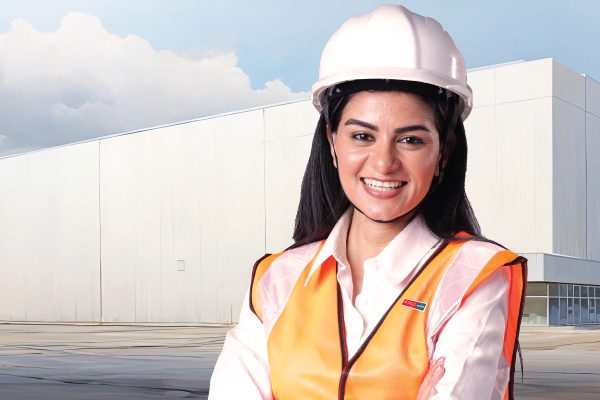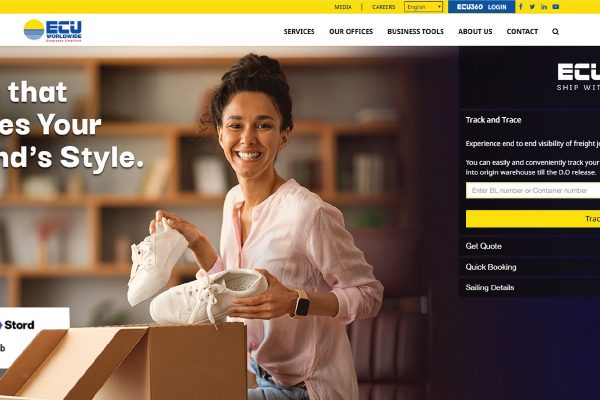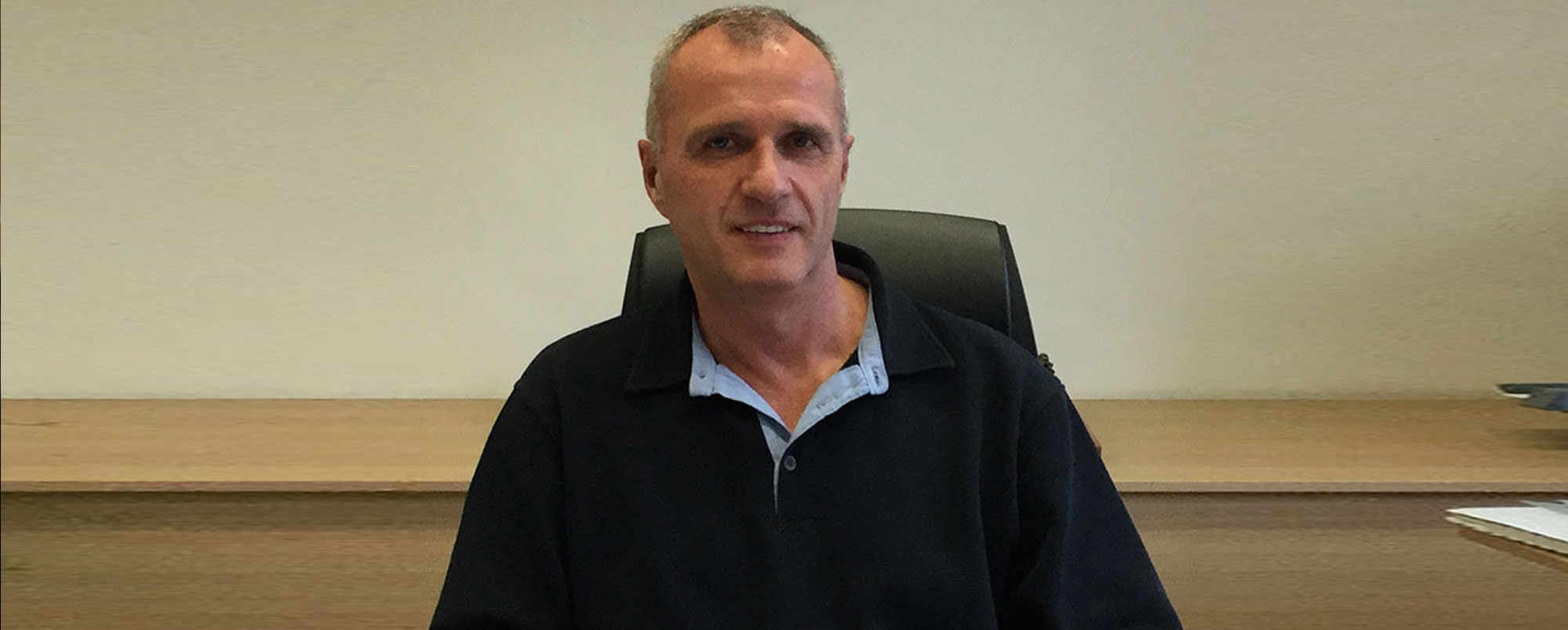The shipping industry: Then and nowAn ECU Worldwide Perspective Marc Stoffelen started out as employee number 17 in Eculine when it was a small cargo carrier in Antwerp. Back then he was the operational head of exports to select geographies and all imports to Antwerp. Eculine is now a global player and was rebranded as ECU Worldwide recently. Since November 2016, Marc’s role has also expanded. Today, he is Executive Director in charge of ECU Worldwide’s global operations business, in addition to overseeing operations in the European market. Having spent close to 30 years at ECU and seen it change and grow from very close quarters, Marc believes that being adaptable to change is the mark of a true leader. In this tete-a-tete with Compass, Marc talks about his eventful journey at ECU, trends and disruptors that he believes will shape the industry, and his personal interests and family.
Q. You have been one of the pioneers of ECU Worldwide since its inception. How would you describe the evolution of the company?
Answer: It’s amazing to see how ECU Worldwide has evolved and transformed as an organisation. We were a small local NVO in Antwerp when we started, and now we are a global leader in LCL consolidation with operations spread out in 300+ offices in 180 countries.
In the very early days, ECU saw enormous growth. That was the time when we opened offices all over the world at breakneck speed. We opened up foreign offices almost weekly! We have been pioneers in many different ways: ECU was the first company to start container consolidation on a neutral basis, which was unheard of when we started. ECU has been one of the fastest adopters of technology and IT, in contrast to the industry practice of slow technology adoption. Our E2C program has been a great success. We have been pioneers in Latin America and Africa too. In Africa, ECU was the first neutral NVO player, which remains a milestone for us.
The financial foundations, however, were not as steady as they are now. Allcargo brought the company the much-needed solid financial base for growth and helped put more emphasis on structure and organisation.
In my view, the coming together of ECU and Allcargo is the perfect example of how different cultures can work together and build a great organisation. Shashi has played a big role in this by respecting everyone’s culture and identity.
The fact that we’ve hardly had any turnover of the staff and key people in our group points towards the success of the integration, not just for us as an organisation, but for our customers too.
Q. ECU Worldwide is now the global leader in LCL, how has the journey been? What do you foresee in the near future?
Answer: The journey has been challenging yet very rewarding. We have worked very hard to put ECU’s name on the LCL map and are happy that we are a major LCL operator in almost all countries. We are one of the top 3 players in the global LCL market and I feel we have the potential to grow further. FCL will also become an important pillar for our business strategy, going forward.
Q. What were the changes that the industry saw in 2016? How will they impact business in the near future?
Answer: The market is changing rapidly with rampant mergers and acquisitions, especially with shipping lines. Maersk Line recently acquired Hamburg Sud, and the CMA CGM Group made history in 2016, by acquiring the Singapore-based container shipping company, NOL. 2016 also saw Hapag-Lloyd and UASC signing up a joint venture, while another joint venture is coming up between three main Japanese carriers.
These changes and the emergence of very large players will have a big impact on our shipping industry. I expect rates to go up sometime middle of next year and that’s something our industry really needs. IT will continue to emerge as an integral part of business as the pressure on margins continue, making it imperative for companies to automate workflows to keep costs under control.
Q. What are the challenges ECU faced and how did you counter them?
Answer: Many of our global accounts have put a lot of thrust on developing their LCL product offerings in the last 10-15 years. The result is that the lines between our customers and competitors have started blurring, with many of our customers becoming competition too. We have been able to tide over this challenge by finding the right balance and having a healthy mix of global accounts and small and medium-sized local accounts.
Q. What kind of opportunities and risks do you see for your clients in 2017, given the fact that you closely work with ECU’s key clients?
Answer: If FCL rates go up, more LCL options will become available in the market, which will emerge as an opportunity for us and our customers. Low margins will continue to be a challenge for the industry.
Q. Any particular geography where you see lot of potential for business expansion?
Answer: The Transpacific trade lane is very exciting for us, as we are still a relatively small player there. We have a huge potential to grow. Further, in countries such as Spain, Holland and China, where we have not yet reached the top three slot, there’s room for strong growth. That said, the volumes will not grow much over time so it will be difficult to grow big in markets where we are very strong already.
Q. New-age disruptors are challenging most industries and have taken over a large chunk of the revenue pie. E-commerce did it to the retail industry and aggregators to the hospitality industry. Will disruptors also change the dynamics in the shipping and logistics industry?
Answer: Conventional commercial freight and logistics companies will be challenged by new-age disruptors such as local network builders, crowdsourcing fillers (like Cargomatic) that connect shippers and carriers through Web and mobile apps, and big data manipulators (Echo Global Logistics and Keychain Logistics) that harness digital capabilities and the power of analytics to satisfy shippers that require more consumer-like buying experiences and greater control over their shipments.
However, these new-age companies will have a hard time capturing the industry. I don’t see them becoming full-blown players offering end-to-end services, the way established companies offer.
Q. Do you see players in the industry changing and embracing technology to become smarter? Please give examples.
Answer: The shipping industry has been very slow in introducing IT in the past but is catching up quickly now. Let me give you an example: The port of Durban recently announced the introduction of new-age technologies (drones, track-and-trace technology, mobile apps, smart meters, 3D printing) in building an efficient data-rich and information-rich ecosystem, connecting port assets, port employees, terminal operators and the port community including road and rail. IT and automated solutions will be the major force that will drive change for the industry.
Q. You travel a lot to network with key customers. What are some of the most interesting places you have visited?
Answer: Every country and city has its own charm and identity and I am blessed to have visited many such wonderful places because of my work. My favourite places are Dubai, Singapore and Thailand. But, my most favourite place is home!
Q. What are your interests outside work? Do you take time out to pursue them?
Answer: I am a soccer fan and like to watch games in the weekend. I also make it a point to watch football on foreign soil, at least once a year with my son. On weekends, I take off for cycling rounds and that helps me to keep in shape.
Q. Please tell us about your family and how do you bond with them?
Answer: I have been married for 33 years. I have one son and two daughters. My youngest daughter lives with us.














